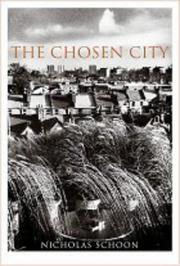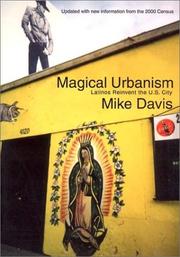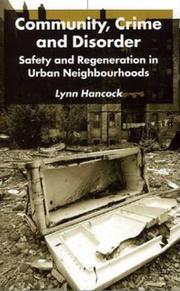| Listing 1 - 4 of 4 |
Sort by
|
Book
ISBN: 0815798687 9780815798682 Year: 2001 Publisher: Washington, D.C. : Brookings Institution Press,
Abstract | Keywords | Export | Availability | Bookmark
 Loading...
Loading...Choose an application
- Reference Manager
- EndNote
- RefWorks (Direct export to RefWorks)
Some of today's best urban leaders don't work for the government--they can be found in nonprofit organizations that serve the working class and poor populations. Based on interviews conducted in major cities including Atlanta, Chicago, Houston, San Francisco, Washington D.C., and New York, this study focuses on exceptional leaders who have developed effective solutions to the complex problems of our inner cities, including education, economic development, and community safety. The book includes profiles of innovators such as Robert Woodson, founder of the Washington, D.C. based National Center for Neighborhood Enterprise, whose work on affordable housing, gang violence, and black entrepreneurship earned a MacArthur Foundation Fellowship (the "genius" award); MacArthur Fellowship and Heinz Prize winner Bob Moses, founder of the Algebra Project that prepares low-income students for joining today's technology-dominated workforce; Rheedlen Center head Geoff Canada, who received the Heinz Prize for his "anti-violence among youth" work; and Reverend Eugene Rivers, one of the founders of the Ten-Point Coalition that helped to reduce gang violence in Boston. The New Urban Leadership investigates how and why expert problem solvers chose their career paths, what qualities make them especially successful in their work, and the methods they use to train the next generation of urban leaders.
Urban renewal --- Inner cities --- Civic leaders

ISBN: 0415258014 0415258022 9780415258012 9780415258029 9780203639085 9781134515615 9781134515653 9781134515660 Year: 2001 Publisher: London New York Spon Press
Abstract | Keywords | Export | Availability | Bookmark
 Loading...
Loading...Choose an application
- Reference Manager
- EndNote
- RefWorks (Direct export to RefWorks)
"Nicholas Schoon argues that the foremost priority for regeneration is to make neighborhoods and cities places where people with choices choose to live. The author surveys the last two centuries of metropolitan growth and decay, analyzes the successes and failures of recent changes in urban policy, and proposes a wide range of radical measures to make the renaissance a reality. Comprehensively researched, the book serves as a wake-up call for everyone interested and involved in urban regeneration."--Jacket.
Cities and towns --- Metropolitan areas --- Inner cities --- Urban renewal --- Conurbations --- MAs (Metropolitan areas) --- Metropolitan statistical areas --- Urban areas

ISBN: 185984328X 9781859843284 Year: 2001 Publisher: London: Verso,
Abstract | Keywords | Export | Availability | Bookmark
 Loading...
Loading...Choose an application
- Reference Manager
- EndNote
- RefWorks (Direct export to RefWorks)
Is the capital of Latin America a small island at the mouth of the Hudson River?Will California soon hold the balance of power in Mexican national politics? Will Latinos reinvigorate the U.S. labor movement? These are some of the provocative questions that Mike Davis explores in this fascinating account of the Latinization of the American urban landscape. As he forcefully shows, this is a demographic and cultural revolution with extraordinary implications. With Spanish-surnames increasing five times faster than the general population, salsa is becoming the predominant ethnic rhythm (and flavor) of contemporary city life. In Los Angeles, Houston, San Antonio, and (shortly) Dallas, Latinos outnumber non-Hispanic whites; in New York, San Diego and Phoenix, they outnumber blacks. According to the Bureau of the Census, Latinos will supply fully two thirds of the nation's population growth between now and the middle of the 21st century when nearly 100 million Americans will boast Latin American ancestry. Davis focuses on the great drama of how Latinos are attempting to translate their urban demographic ascendancy into effective social power. Pundits are now unanimous that Spanish-surname voters are the sleeping giant of US politics. Though the overall vote in the 1996 elections declined significantly, the Latino share rose by a spectacular 16%. Yet electoral mobilization alone is unlikely to redress the increasing income and opportunity gaps between urban Latinos and suburban non-Hispanic whites. Thus in Los Angeles and elsewhere, the militant struggles of Latino workers and students are reinventing the American left.
Hispanic Americans - Social conditions. --- Hispanic Americans - Politics and government. --- Inner cities - United States. --- City and town life - United States. --- Sociology, Urban - United States. --- United States - Civilization - Hispanic influences. --- United States - Population. --- United States - Ethnic relations. --- Hispanic Americans --- Inner cities --- City and town life --- Sociology, Urban --- United States

ISBN: 0333761499 Year: 2001 Publisher: Houndmills : Palgrave,
Abstract | Keywords | Export | Availability | Bookmark
 Loading...
Loading...Choose an application
- Reference Manager
- EndNote
- RefWorks (Direct export to RefWorks)
Social problems --- Great Britain --- Crime --- Inner cities --- Urban policy --- Environmental aspects --- Sociological aspects. --- Sociological aspects --- City crime --- Crime and criminals --- Crimes --- Delinquency --- Felonies --- Misdemeanors --- Urban crime --- Social aspects --- Criminal justice, Administration of --- Criminal law --- Criminals --- Criminology --- Transgression (Ethics) --- Banlieues --- Desordres --- Ecologie criminelle --- Gestion urbaine --- Securite
| Listing 1 - 4 of 4 |
Sort by
|

 Search
Search Feedback
Feedback About UniCat
About UniCat  Help
Help News
News